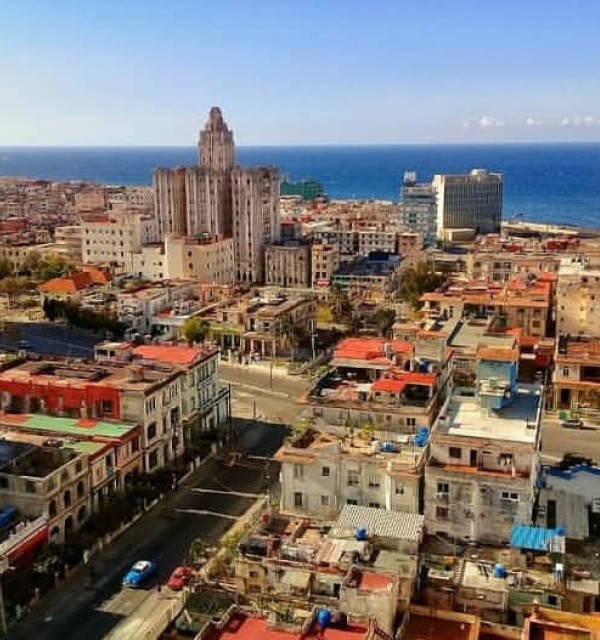Here you can learn more about the conference's keynote speakers and presenters.

Keynote speakers
- Professor Juliana Martinez Franzoni, Costa Rica.
- Professor Vishanthie Sewpaul, South Africa.
- Member of parliament Ingrid Fiskaa, Rogaland, Norway.
- Professor Morten Tønnessen, Norway.
- Professor Ingunn T. Ellingsen, Norway.
- PhD Vegard Bye, Norway.
- PhD Mayra Espina Prieto, Cuba.
- Dayma Echevarría, PhD, Cuba.
- PhD Teresa Muñoz, Cuba.
- PhD Clotilde Proveyer, Cuba.
Presenters
- PhD Ståle Wig, Norway
- Professor Marit Ursin, Norway
- Professor Ángela Peña Farías, Cuba
- Professor Osnaide Izquierdo , Cuba
- Professor Siv Oltedal, Norway
- Professor Niuva Ávila, Cuba
See more detailed info on the keynote speakers and presenters below.
Juliana Martinez Franzoni
Juliana Martínez Franzoni is a full professor at the University of Costa Rica and a Georg Forster Awardee by the Alexander von Humboldt Foundation in Germany, aimed at rewarding outstanding academic research trajectories in the global south.
Her publications have attracted the attention of international specialists and are an international benchmark in the field of welfare regimes in Latin America. Her work has also served governments and international organizations such as ECLAC, UNICEF and UNDP in the framework of public policy formation processes. Her research has also focused on the interaction between social and labor policies, and on the interaction between work and family within the framework of welfare regimes.
Her latest book is The Quest for Universal Social Policy in the South: Actors, Ideas and Architectures (Cambridge University Press, 2016 and Editorial de la UCR, 2019), written with Diego Sánchez-Ancochea (University of Oxford). She has published six other books alone or co-authored and published numerous articles in international indexed journals. Her most recent work focuses on whether social policy responses to the pandemic have brought opportunities for change in social policy in Central America and on public opinion regarding cash transfers in seven countries of Latin America. She is co-editor of Social Politics (Oxford University Press) and the Elements series on society and politics in Latin America (Cambridge University Press).
Professor Vishanthie Sewpaul
Presentation: The problematization and decolonization of social work ethics.
In this presentation I focus on the International Association of School of Social Work’s 2018 Global Social Work Statement of Ethical Principles (GSWSEP). Social work has been assaulted by the intersecting influences of a triad of giants: 1) neoliberal capitalism, 2) science of the logical positivist tradition, and 3) new public management. From the time of its inception, social work took on the dominant voice of science of the logical positivist tradition, which was exported from the west to the rest of the world through colonialization and missionisation. Empiricism, measurement, generalisation, linear causality, and the proof-is-truth axiom became dominant in social work. Positivism’s illusion of detachment in working relationships, neutrality, social worker as expert, universal laws, and t
In this presentation I focus on the International Association of School of Social Work’s 2018 Global Social Work Statement of Ethical Principles (GSWSEP). Social work has been assaulted by the intersecting influences of a triad of giants: 1) neoliberal capitalism, 2) science of the logical positivist tradition, and 3) new public management. From the time of its inception, social work took on the dominant voice of science of the logical positivist tradition, which was exported from the west to the rest of the world through colonialization and missionisation. Empiricism, measurement, generalisation, linear causality, and the proof-is-truth axiom became dominant in social work. Positivism’s illusion of detachment in working relationships, neutrality, social worker as expert, universal laws, and the separation of the professional from the personal became infused into professional ethics. The reification of positivist professionalism fits with new public management and neoliberal agendas, as cost-saving, profit, bureaucratic control, efficiency, and narrowly defined outcomes, take precedence over relationships, trust-building, kindness, care and compassion, thus challenging social work’s narrative of exceptionalism. While core social work principles, on the surface, may seem to be uncontentious, closer examination reveals that they are highly contingent upon culture, space, and time. The GSWSEP problematises these principles and in doing so challenges Western hegemonic views and embraces a decolonised approach to social work ethics. Underlying the triad of giants is the taken-for-granted assumptions and blind spots that we hold as social workers. This is addressed in the GSWSEP, underscoring the central role of emancipatory praxis in awakening individual and societal consciousness.
Ingrid Fiskå
Ingrid Fiskaa (born 1977) is member of the Norwegian National Parliament for Rogaland 2021-2025, representing Socialist Left Party.
She is member of The Standing Committee on Foreign Affairs and Defence, She is also member of The Delegation for Relations with the European Parliament.
Former government positions: State secretary, Ministry of Foreign Affairs, 20 November 2009–30 March 2012
See: Biography: Fiskaa, Ingrid (stortinget.no).
Morten Tønnessen
Morten Tønnessen (born 1976) is Professor of philosophy at University of Stavanger, Norway.
In the period 2021–2023 he was Head of department at University of Stavanger´s Department of social studies. He has also served as Vice-Dean of Research at University of Stavanger´s Faculty of social sciences (2019–2020).
Tønnessen is currently doing research on the Human Development Index and issues related to economic growth and wellbeing. In 2019 he was a guest editor, along with Sarah Hean, Siv Oltedal and Angela Pena of the special issue of Journal of Comparative Social Work „Welfare in Latin America and the Nordic countries“. He is co-author, with Alexei Sharov, of Semiotic Agency: Science beyond Mechanism (Springer, 2021). Recent articles and book chapters include “Human development, inequality and social risks in Latin America and the Nordic countries” (2019), “The true value of „doing well“ economically” (2020, in Piero Formica & John Edmondson (eds.), Innovation and the Arts: The Value of Humanities Studies for Business), “Current human ecology in the Amazon and beyond: A multi-scale ecosemiotic approach” (2020), “Anticipating the societal transformation required to solve the environmental crisis in the 21st century” (2021) and “Recreation in the outdoors – exploring the friluftsliv experience of adolescents at residential care” (2022, with Joakim Jiri Haaland). Tønnessen is a member of the International Society for Quality-of-Life Studies (ISQOLS).
Ingunn Tollisen Ellingsen
Ingunn T. Ellingsen is a full professor of social work at the Faculty of Social Sciences, University of Stavanger (UiS), Norway.
She currently leads an inter-disciplinary network for welfare research, involving welfare organizations and researcher from different disciplines and research units. Her research is particularly concerned with child welfare research, family relations and follow-up to foster children and parents who have lost custody for their children. She has a specific interest in research methods suitable for including children’s perspectives and participation in research. Ellingsen is an experienced researcher. She has been involved in both national and international research projects, e.g. the Welfare State future project “Family complexity and social work: A comparative study of family-based welfare work in different welfare regimes” (NORFACE). The project compared policies and family-based social work in different welfare contexts (eight countries) and services areas: child welfare, substance misuse, migration and mental health.
Ellingsen carried out her PhD in Special Education Needs at the UiS (2011), where she explored how children in long-term foster care perceived family, and how the children’s family perspectives were understood by their foster carers and parents.
Vegard Bye
Dr.philos in political science (University of Oslo, 2019), with the thesis: “The end of an era or a new beginning? Economic reforms with potential for political transformation in Cuba on Raúl Castro's Watch (2008-2018)”.
Book based on the doctoral thesis: “Cuba, From Fidel to Raúl and Beyond” (PalgraveMacmillan, 2020). Master's degree in political science (University of Oslo 1977), with the thesis: "The nationalization of oil in Venezuela: a study on modifications in dependency relations." First book published on Cuba: “ Esto es Cuba - lo demos es cuento» ("This is Cuba – Everything Else is a Lie”) (Publicaciones La Otra Cuba, Mexico D.F., 1998, based on its original in Norwegian, 8 editions published so far). Vegard Bye began his relationship with Cuba working as a Junior Professional Officer with the United Nations Development Program (UNDP) in Havana (1977-1979). In his professional career he has combined academic work: researcher at the Norwegian Institute of International Relations (NUPI), Peace Research Institute of Oslo (PRIO); with duties as a senior government official (Norad); United Nations official (United Nations Human Rights Representative in Angola and Bolivia); leader of Norwegian NGOs (Norwegian People's Aid - APN; the Forum for Development and the Environment - SUM); Alternate Representative to the Norwegian Parliament (1993-1997); journalist and correspondent (i.a. in Central America); author of 6 books published on Latin American topics); consultant (directed more than 75 evaluations of international development projects). Solidarity activist with Latin America: Co-founder (1976) of the Solidarity Committees with Latin America (LAG); President of the Norwegian Solidarity Council for Central America (1980 – 1984). He coordinated a collaborative project between the University of Oslo (Center for Development and the Environment – SUM) and the Center for Study on the Cuban Economy (CEEC) of the University of Havana (2012-2017), publishing a considerable number of academic articles on Cuba's economic policy. Currently Senior Partner of the consulting company Scanteam (Oslo) and researcher linked to Chr. Michelsen Institute (Bergen), coordinating an academic cooperation program between Norway and Angola (2021-2024). Professional experience from almost all Latin American countries.
Mayra Espina Prieto
PhD in Sociological Sciences. For more than 25 years she was a researcher at the Center for Psychological and Sociological Research (CIPS) in studies on inequalities and social policy.
Until today he has taught in national and foreign university institutions topics such as Sociology of Inequalities (University of Havana, undergraduate and master's degree), Social Policies (Master FLACSO-Cuba Program), Complexity approach in social sciences (FUNGLODE diploma, Dominican Republic), Development models in Latin America (doctorate, Autonomous University of Honduras), Local development (diploma, Institute of Transdisciplinary Studies of the Peninsula University, Ecuador). She is a member of the Editorial Board of Temas Magazine.
Dayma Echevarría León
Degree in Sociology, (1996), Master in Management Processes, (2000), PhD in Sociological Sciences (2008), from the University of Havana. Professor at the Center for the Cuban Economy.
She has coordinated six research projects, four of them international. She has also worked in processes of articulation of actors for local development. She is part of the Steering Committee of the Network of Studies on Social Inequality and Mobility in Latin America (DEMOSAL), the Network of Studies of Work in Cuba, coordinated by CIPS, the Social Policy Network coordinated by Flacso Cuba and the Working Group of CLACSO Gender, (Des) Equalities and Rights in Tension. Author of more than 30 scientific articles on the main lines of research with which she works: gender, employment and power, processes of economic transformations and their impact on inequality.
Teresa del Pilar Muñoz Gutiérrez
Dr. C. Philosophical Sciences and Professor of the Department of Sociology, with forty-six years of teaching at the University of Havana.
She has taught in the career of Philosophy and Sociology all the subjects of Sociological Theory; Latin American and Cuban Sociological Thought; Social Structure and Inequalities; Social Policies, and Sociological Theory Workshop. In addition, he has taught History and Theory of Social Work. He is currently researching Cuban Theory and Social Thought from the perspective of the Sociology of Knowledge and about the care of older adults and their institutionalization in Cuba. Since 1998 he has researched and taught classes in the specialty of Social Work and participated in the elaboration of the study programs first for the UH Degree (1998), then for the Middle Technician in Social Work (2013) and currently for the Higher University Technician in Social Work UH (2021). He has participated in events in Cuba and abroad and has more than 50 articles published in national and international journals of sociology and related to social work in Cuba, as well as in some books. She has held academic and administrative responsibilities at the University of Havana: Vice-Dean of Research and Postgraduate, Dean of the Faculty of Philosophy and History, President of the Scientific Council of the Faculty and President of the National Court of Scientific Degrees of Sociological Sciences.
Clotilde Proveyer Cervantes
Degree in Sociology from the University of Havana in 1978. PhD in Sociology from the University of Havana in 2001. She is a tenured professor and consultant of the Department of Sociology of the University of Havana since 1978.
She develops the lines of research on Gender Studies, on Gender Violence in Cuba and on Gender and Education, as a result of which she has published numerous articles in national and foreign publications, has published 9 books, of which 1 is of her total authorship, 3 in co-authorship, 2 books as compiler and 3 as coordinator. She is a member of the National Commission of Sociology Career, of the National Court of Doctorate of the specialty of Sociology, of the Academic Committee of the Master's Degree in Sociology of the University of Havana and of other Masters of the University. She has been a guest professor in Master's and doctoral courses at universities in Latin America, several countries in Europe and Canada and the United States. She is coordinator of the Expert Advisory Team of the Federation of Cuban Women (FMC) on gender violence, is a member of the Study Group on Gender, Sexuality and Family of the Department of Sociology (UH) and member of the Women's Chair (UH). She is a member of the Editorial Committee of specialized journals. She has won national and international awards for his research work. She collaborates as a consultant and/or advisor with several institutions, agencies, non-governmental organizations and United Nations agencies in Cuba, in relation to gender studies and gender violence.
Ståle Wig
Ståle Wig is a social anthropologist at the University of Oslo. He has done research in Lesotho and Cuba, specializing in the ethnographic study of markets and everyday economic life.
He gained a Ph.D in Social Anthropology at University of Oslo in 2020, with a thesis about Cuba's market reforms.
Wig has also written a book about the Norwegian Prime Minister, and about a taxi in Havana, called Havana Taxi: life and lies in the new Cuba (Kagge Publishers 2022).
Marit Ursin
Marit Ursin is Professor in Childhood Studies at the Department of Education and Lifelong Learning, Norwegian University of Science and Technology.
She does qualitative research with children, youth, and families, primarily in Norway and Latin America.
Her interests are children's rights and young citizenship, diverse forms of child and youth mobility and migration, and marginalization processes in childhood and youth. She has conducted a longitudinal study on the street in urban Brazil, following a group of boys on the verge of adulthood. Her post doc explored the consequences of drug trafficking in the everyday lives of children and youth in a socially deprived neighbourhood in Salvador, Brazil. In recent years, Ursin has devoted her research time to exploring children’s rights in the social welfare system as well as young people’s political rights in Norway. Ursin is head of the master’s program MPhil in Childhood Studies and teaches children's rights on BA to PhD level. She is editor-in-chief of the Nordic journal BARN.
Ángela Peña Farías
Degree in Sociology (2001- University of Havana) Master in Comparative Social Work (2005-Regional University of Bodo, Norway), PhD in sociology (2014-University of Havana). Professor category of Professor at the University of Havana. She currently serves as Monitoring and Evaluation Officer for UNICEF Cuba
At the University of Havana she has taught various subjects between 2001 and 2022, among which the Classical and Contemporary Sociological Theories, the Problems of the social structure and inequalities, and Sociology of Social Policies stand out. He currently serves as Monitoring and Evaluation Officer for UNICEF Cuba. Fellow of the Latin American Council of Social Sciences research project competitions in 2009 (CROP) and 2013 (ASDI), National Prize of the Academy of Sciences of Cuba 2014 and Honorable Mention in International Contest of President Nestor Kitchner Scholarship 2015. She has coordinated both international and national collaboration projects. She has published and coordinated articles, issues of magazines and books on the subject of social inequalities, poverty, and social policies, care for the elderly in Cuba, among other topics.
Osnaide Izquierdo Quintana
Doctor in Sociology, Full Professor and Head of the Department of Sociology of the Faculty of Philosophy, History and Sociology of the University of Havana.
He specializes in topics of Sociology of Work and Economic Sociology with a focus on research on the development model and the role of work and economic actors in its evolution. He is a member of several research and advisory groups to institutions in the country. He is a member of several Cuban and Latin American research networks on these issues. Among his national and international publications are the compilation and edition of the book "Decent Work and Society, Cuba from the perspective of socio-labor studies" (2017), co-authorship of the "book Sociology of Work" (2018). Book article. "Institutional change and work in Cuba. The value of work and workers in the institutional narrative of the transformation of the economic and social model". In: Let's talk about work in Cuba. (2019). Book article "The formalization of labor informality. The processes of precariousness of labor relations in Cuba based on the subsistence strategies of workers." Latin American Treaty on Labour Anthropology (2020) Coordination and presentation of the DOSSIER: Informal, precarious and unstable jobs, for Vol 5, No 10. Latin American Journal of Labor Anthropology RLAT. (2021). Book article "The evolution of work in Cuba. A look with sociological lenses." (2022). Perspectives on Work and Social Justice.
Professor Siv Oltedal, Norway
Siv Oltedal is Professor in Social Work at the University of Stavanger, Norway. Her research publications are in the areas of family complexity and work inclusion.
She has written and co-written books about Gender in Social Work, Social Work theories, Talk at Welfare Office and about Social work & Law at the Nav office.
esearchers from England, Ireland, Sweden, Norway, Lithuanian, Bulgarian, Chile and Mexico collaborated. First Norwegian leader of Norpart 2018/10005 DIKU project: Cuban and Nordic Welfare (2019-2023), Leader of Nordic Master in Social Work and Welfare, joint program between Universities of Stavanger and Aalborg (2017-2023). Editor in Chief of Journal of Comparative Social Work.
Niuva Ávila Vargas
Sociologist and Auxiliar Professor of the Department of Sociology of the University of Havana.
She has conducted research related to Higher Education, Educational Policies, Family and educational processes. She is part of the "Health, Gender and Family" group of the Department of Sociology, member of the Chair of Health of the University of Havana, collaborates with the group of "Sociology of Education and Development" and member of the Editorial Board of the University of Havana Magazine. She is a member of the Research Network on Gender Differentials in Ibero-American Higher Education and coordinates the Research Group on the Care of the Elderly (GICAM) of the Department of Sociology-UH. She has published about twenty articles, in journals, conference proceedings and books as author or co-author, on various topics. They highlight "A sociodemographic study of access to Higher Education in Cuba. The role of the family in a context of broad access policies", CEDEM, Havana 2013. ISBN: 978-959-7005-69-8 and "Gender, Health and Sexuality" (compiler) CEDEM, Havana 2013. ISBN: 978-959-7005-71-1. He has taught in different undergraduate and postgraduate subjects. She has made tutorials, presentations and has been a member of tribunals. She is currently the main professor of the subjects Sociology of Social Prevention and Sociology of the Family.



